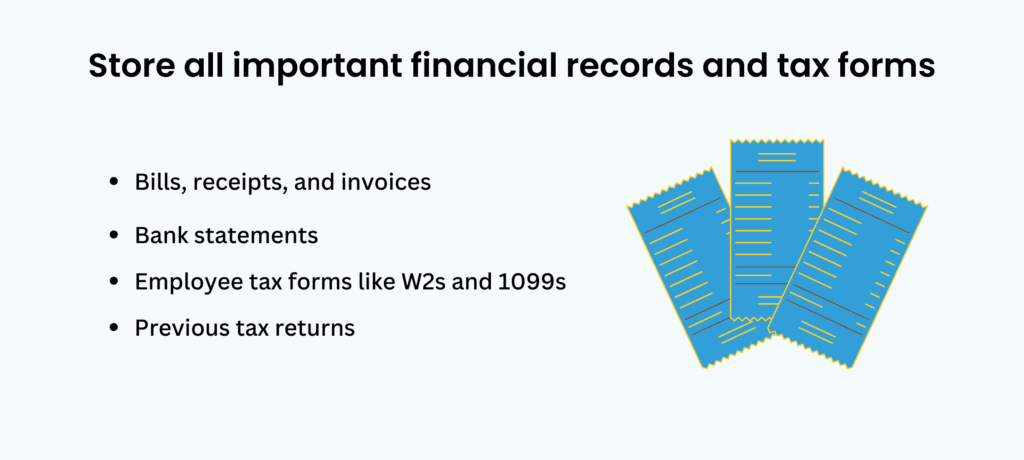
A study found that nearly half (44%) of startup businesses didn't succeed because they didn't have enough money. So, it's super important to make sure your startup doesn't run out of money before it starts making money or gets support from investors. Proper startup accounting is key to staying on top of your finances and ensuring your business's financial health.
Even when your startup starts making money, you need to be careful not to spend more than you earn. So, how can you make sure you're in control of your startup's money? Keeping really good records of your money coming in and going out will help your startup stay healthy and keep growing.
The first step in managing your startup's finances is choosing the right business structure. Common options include sole proprietorship, partnership, LLC, and corporation. Each structure has its advantages and disadvantages, so choose the one that aligns with your business goals and consult with a legal or financial advisor if needed.
Decide between two primary accounting methods – cash basis and accrual basis. Cash basis records transactions when cash changes hands, while accrual basis records income and expenses when they occur, not just when money exchanges. The accrual method is often more accurate for startups but pick the one that suits your business model and complies with tax regulations.
You can handle your startup's money stuff in different ways – by writing it all down on paper, using a computer program, or using a big fancy system called ERP.
You've got to make sure that every time your business gets or spends money, you write it down in a special book. For instance, when you pay salaries or bills, that's like spending money, so you write it down as a debit. But when customers pay you, it's like you're getting money, so you write it down as a credit.
Every money move you make – like what you earn, what you spend, what you get, and what you take away – has its own special note in your book. If you're doing it all by hand, you'll need to write these notes in your book yourself.
But if you use accounting software, it's like having an online book that writes things down for you automatically. So when you make invoices or pay bills, it keeps a record for you.

Regularly reconcile your bank accounts to ensure your accounting records align with your actual bank statements. Reconciliation involves comparing the transactions in your accounting software with those in your bank statement. Any discrepancies should be investigated and resolved promptly, helping prevent errors and fraud.
Overview: The balance sheet, also known as the statement of financial position, provides a snapshot of your startup's financial health at a specific point in time.
A well-prepared balance sheet should always balance, meaning that the total assets should equal the total liabilities plus equity. This equation holds true and is the foundation of the balance sheet.
Overview: The income statement provides a summary of your startup's revenues, expenses, and profits (or losses) over a specific period, usually a month, quarter, or year.
The income statement is a valuable tool for tracking your startup's profitability and assessing the effectiveness of your business operations.
Overview: The cash flow statement tracks how cash flows in and out of your startup during a specific period. It's crucial for understanding your liquidity and cash management.
A positive cash flow indicates that your startup is generating more cash than it's spending, which is generally a good sign. It's essential to manage your cash flow effectively to ensure you have enough funds to cover your operating expenses and investments.
Understanding these key financial statements is essential for making informed decisions and maintaining financial stability in your startup. These statements provide the basis for financial analysis, budgeting, and financial planning.
QuickBooks for startups is known for its ease of use, robust invoicing capabilities, and efficient expense tracking. It provides an ideal solution for startups looking to manage their finances effectively and efficiently..
Xero is a cloud-based accounting platform that excels in collaboration and automation features. It's well-suited for startups looking for real-time financial insights.
FreshBooks is an excellent choice for small businesses, offering invoicing, expense tracking, and time management features. It's simple to use and helps streamline financial tasks.
Wave is a free accounting software with essential features for budget-conscious startups. It offers invoicing, expense tracking, and payroll capabilities.
Stay organized: Keep all your financial documents and receipts well-organized, making it easier to track expenses and income.
Regularly review finances: Set aside time each month to review your financial statements. This will help you spot trends and make informed decisions.
Separate business and personal finances: Open a separate business bank account to keep your personal and business finances distinct.
Hire a professional if necessary: If your financial situation becomes too complicated, consider hiring a professional for bookkeeping for startups to ensure accuracy. Having an experienced expert on board can help you manage your finances effectively and navigate any complexities.
Stay current on tax regulations: Tax laws change, so staying up to date is crucial, especially when considering tax services for startups. Keeping abreast of these changes is essential to avoid surprises during tax season and to ensure your startup receives the necessary support to navigate the complexities of tax regulations effectively.
Budget wisely: Create a budget and stick to it. It will help you manage your finances effectively and ensure you're on the right path.
Managing start up bookkeeping may seem overwhelming, but with the right approach and tools, it becomes manageable. Accurate financial records are essential for making informed business decisions and complying with tax regulations, especially for your business startup accounting. It's crucial to keep track of your money and expenses accurately to make smart choices and stay on the right side of tax rules as you start your business. By following the steps, utilizing the right tools, and staying organized, you can ensure that your startup's financial future is bright.
This guide provides a solid foundation for your startup accounting journey, but remember that professional advice may be necessary for more complex financial scenarios. Your startup's financial health is crucial to its success, so keep learning and improving your accounting skills as your business grows.
If you're located in the USA and are seeking top-notch outsourced bookkeeping services for startups, contact our experts at “BookkeeperLive”. Not only will you receive accounting solutions, but you will also have the opportunity to enjoy a free trial of our bookkeeping services. Don't waste any more time; schedule a meeting now and get your startup's bookkeeping in order.
Q1. Do I need to hire an accountant for my startup?
It depends on the complexity of your finances. Many startups handle accounting themselves or use accounting software. However, hiring an accountant can be beneficial for more complex financial situations.
Q2. What's the difference between an accountant and a bookkeeper?
An accountant typically offers more comprehensive financial services, including financial analysis and tax planning. A bookkeeper focuses on recording transactions and maintaining financial records.
Q3. Can I switch accounting methods later on?
Yes, you can change your accounting method, but it may require approval from tax authorities and may have tax implications. Consult with a professional before making the switch.
Q4. Is cloud-based accounting software secure?
Most reputable cloud-based accounting software providers use robust security measures to protect your financial data. Be sure to choose a trusted and reputable software provider to ensure data security.
A study found that nearly half (44%) of startup businesses didn't succeed because they didn't have enough money. So, it's super important to make sure your startup doesn't run out of money before it starts making money or gets support from investors. Proper startup accounting is key to staying on top of your finances and ensuring your business's financial health.
Even when your startup starts making money, you need to be careful not to spend more than you earn. So, how can you make sure you're in control of your startup's money? Keeping really good records of your money coming in and going out will help your startup stay healthy and keep growing.
The first step in managing your startup's finances is choosing the right business structure. Common options include sole proprietorship, partnership, LLC, and corporation. Each structure has its advantages and disadvantages, so choose the one that aligns with your business goals and consult with a legal or financial advisor if needed.
Decide between two primary accounting methods – cash basis and accrual basis. Cash basis records transactions when cash changes hands, while accrual basis records income and expenses when they occur, not just when money exchanges. The accrual method is often more accurate for startups but pick the one that suits your business model and complies with tax regulations.
You can handle your startup's money stuff in different ways – by writing it all down on paper, using a computer program, or using a big fancy system called ERP.
You've got to make sure that every time your business gets or spends money, you write it down in a special book. For instance, when you pay salaries or bills, that's like spending money, so you write it down as a debit. But when customers pay you, it's like you're getting money, so you write it down as a credit.
Every money move you make – like what you earn, what you spend, what you get, and what you take away – has its own special note in your book. If you're doing it all by hand, you'll need to write these notes in your book yourself.
But if you use accounting software, it's like having an online book that writes things down for you automatically. So when you make invoices or pay bills, it keeps a record for you.

Regularly reconcile your bank accounts to ensure your accounting records align with your actual bank statements. Reconciliation involves comparing the transactions in your accounting software with those in your bank statement. Any discrepancies should be investigated and resolved promptly, helping prevent errors and fraud.
Overview: The balance sheet, also known as the statement of financial position, provides a snapshot of your startup's financial health at a specific point in time.
A well-prepared balance sheet should always balance, meaning that the total assets should equal the total liabilities plus equity. This equation holds true and is the foundation of the balance sheet.
Overview: The income statement provides a summary of your startup's revenues, expenses, and profits (or losses) over a specific period, usually a month, quarter, or year.
The income statement is a valuable tool for tracking your startup's profitability and assessing the effectiveness of your business operations.
Overview: The cash flow statement tracks how cash flows in and out of your startup during a specific period. It's crucial for understanding your liquidity and cash management.
A positive cash flow indicates that your startup is generating more cash than it's spending, which is generally a good sign. It's essential to manage your cash flow effectively to ensure you have enough funds to cover your operating expenses and investments.
Understanding these key financial statements is essential for making informed decisions and maintaining financial stability in your startup. These statements provide the basis for financial analysis, budgeting, and financial planning.
QuickBooks for startups is known for its ease of use, robust invoicing capabilities, and efficient expense tracking. It provides an ideal solution for startups looking to manage their finances effectively and efficiently..
Xero is a cloud-based accounting platform that excels in collaboration and automation features. It's well-suited for startups looking for real-time financial insights.
FreshBooks is an excellent choice for small businesses, offering invoicing, expense tracking, and time management features. It's simple to use and helps streamline financial tasks.
Wave is a free accounting software with essential features for budget-conscious startups. It offers invoicing, expense tracking, and payroll capabilities.
Stay organized: Keep all your financial documents and receipts well-organized, making it easier to track expenses and income.
Regularly review finances: Set aside time each month to review your financial statements. This will help you spot trends and make informed decisions.
Separate business and personal finances: Open a separate business bank account to keep your personal and business finances distinct.
Hire a professional if necessary: If your financial situation becomes too complicated, consider hiring a professional for bookkeeping for startups to ensure accuracy. Having an experienced expert on board can help you manage your finances effectively and navigate any complexities.
Stay current on tax regulations: Tax laws change, so staying up to date is crucial, especially when considering tax services for startups. Keeping abreast of these changes is essential to avoid surprises during tax season and to ensure your startup receives the necessary support to navigate the complexities of tax regulations effectively.
Budget wisely: Create a budget and stick to it. It will help you manage your finances effectively and ensure you're on the right path.
Managing start up bookkeeping may seem overwhelming, but with the right approach and tools, it becomes manageable. Accurate financial records are essential for making informed business decisions and complying with tax regulations, especially for your business startup accounting. It's crucial to keep track of your money and expenses accurately to make smart choices and stay on the right side of tax rules as you start your business. By following the steps, utilizing the right tools, and staying organized, you can ensure that your startup's financial future is bright.
This guide provides a solid foundation for your startup accounting journey, but remember that professional advice may be necessary for more complex financial scenarios. Your startup's financial health is crucial to its success, so keep learning and improving your accounting skills as your business grows.
If you're located in the USA and are seeking top-notch outsourced bookkeeping services for startups, contact our experts at “BookkeeperLive”. Not only will you receive accounting solutions, but you will also have the opportunity to enjoy a free trial of our bookkeeping services. Don't waste any more time; schedule a meeting now and get your startup's bookkeeping in order.
Q1. Do I need to hire an accountant for my startup?
It depends on the complexity of your finances. Many startups handle accounting themselves or use accounting software. However, hiring an accountant can be beneficial for more complex financial situations.
Q2. What's the difference between an accountant and a bookkeeper?
An accountant typically offers more comprehensive financial services, including financial analysis and tax planning. A bookkeeper focuses on recording transactions and maintaining financial records.
Q3. Can I switch accounting methods later on?
Yes, you can change your accounting method, but it may require approval from tax authorities and may have tax implications. Consult with a professional before making the switch.
Q4. Is cloud-based accounting software secure?
Most reputable cloud-based accounting software providers use robust security measures to protect your financial data. Be sure to choose a trusted and reputable software provider to ensure data security.
BookkeeperLive provides affordable bookkeeping and accounting services tailored to your business goals.





No calls, No meetings, No spam. Get started with a free trial by filling out the form.
*NDA included for your data protection.
Copyright © 2025 BookkeeperLive. All rights reserved. Privacy Policy Terms of Use
Enter the code, fill out the form, and unlock financial clarity with a free trial.